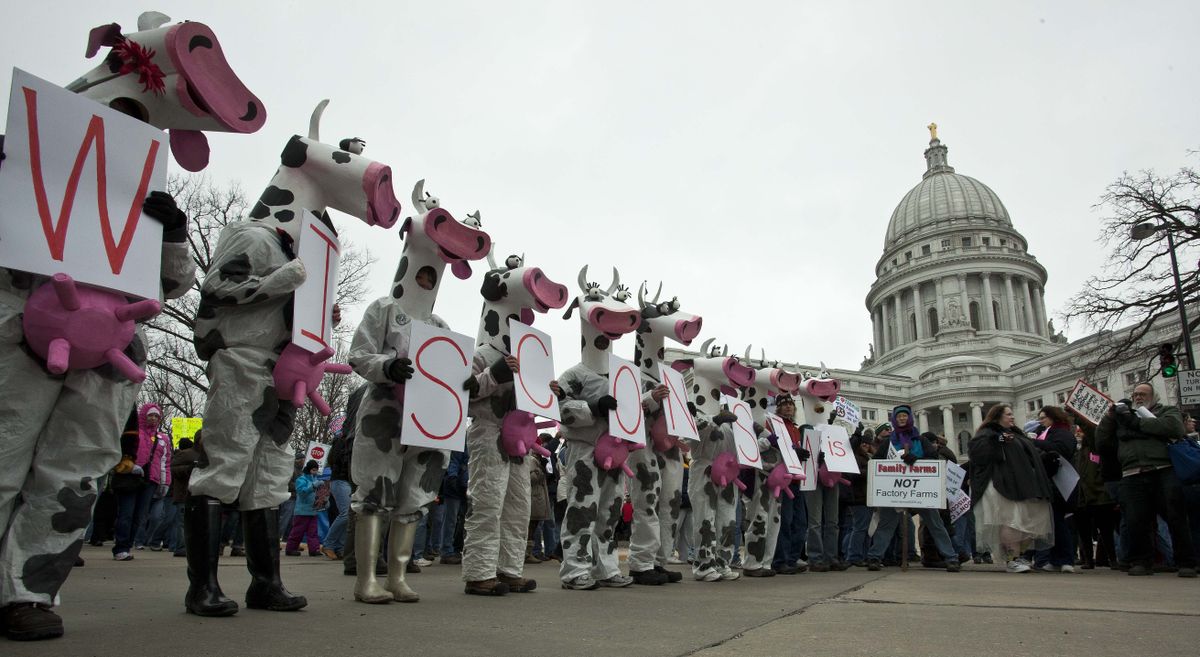Obama gives union groups vocal support
Some want bigger show of solidarity

WASHINGTON – Union leaders urged Vice President Joe Biden during a White House meeting last month to go to Wisconsin and rally the faithful in their fight against Gov. Scott Walker’s move to curtail collective bargaining rights for most public employees.
Request rebuffed, they asked for Labor Secretary Hilda Solis.
So far, however, the White House has stayed away from any trips to Madison, the state capital, or other states in the throes of union battles. The Obama administration is treading carefully on the contentious political issue that has led to a national debate over the power that public sector unions wield in negotiating wages and benefits.
A few labor leaders have complained openly that President Barack Obama is ignoring a campaign pledge he made to stand with unions; most others say his public comments have been powerful enough.
The stakes are high as Obama looks toward a grueling re-election campaign. Republicans have begun airing television ads linking Obama to “union bosses” standing in the way of budget cuts in Wisconsin, Ohio and other states.
As a candidate, Obama seemed to promise more to organized labor, among the Democratic Party’s most loyal constituencies.
“If American workers are being denied their right to organize and collectively bargain when I’m in the White House, I’ll put on a comfortable pair of shoes myself,” Obama said at a speech in 2007. “I’ll walk on that picket line with you as president of the United States of America because workers deserve to know that somebody is standing in their corner.”
Rose Ann DeMoro, executive director of National Nurses United, the nation’s largest nurses union, called Obama “largely a bystander” in the debate over collective bargaining. “I think we’re feeling a sense of betrayal from him and not liking it much,” she said.
Doug Schoen, a Democratic political strategist, said Obama’s strategy seems to be “keep your distance, avoid direct engagement, say most of the right things most of the time, and hope for resolution through sources other than your own.”
Walker on Friday signed a bill that strips most collective bargaining rights from the state’s public workers, except police and firefighters.
Protests have rocked the Capitol almost every day since Gov. Scott Walker proposed taking nearly all collective bargaining rights away from public workers, but the largest came Saturday, one day after the governor signed the measure into law. Madison police estimated the crowd at 85,000 to 100,000 people — along with 50 tractors and one donkey — by late afternoon.
Dozens of fist-pumping farmers drew cheers as they chugged around the Capitol square in tractors bearing signs with messages such as “planting the seeds for a big season of recalls.”
The request for Biden to travel to Wisconsin came from Gerald McEntee, president of the American Federation of State, County and Municipal Employees, according to two union officials familiar with the Feb. 24 meeting. The officials requested anonymity because the meeting was private.
Five days later, during the AFL-CIO winter meeting, McEntee told Obama senior adviser David Plouffe that unions wanted more than words, the officials said. McEntee told Plouffe they wanted a high-profile emissary to stand with protesters to show that the president was by their side.
A spokesman for McEntee, Gregory King, declined comment on the substance of the private meetings, but said the union is “pleased with the support we’ve received from the Obama administration.”
Obama has called Walker’s proposal an “assault on unions” and urged governors not to vilify public workers. After the state Senate relied on a procedural move Thursday to pass the anti-bargaining rights measure without any Democrats in the chamber, White House spokesman Jay Carney said Obama believes it is wrong for Wisconsin to use its budget troubles “to denigrate or vilify public sector employees.”
Solis also pledged her support for public employees on a phone call with thousands of members of the Communications Workers of America.
“Budget sacrifices are one thing but, demanding that workers give up their voice is another,” Solis told the union members.
But asked whether Solis would go to Wisconsin or any other state where protesters are rallying, spokesman Carl Fillichio said she’s “keeping an eye on the situation.”
DeMoro, from the nurses’ union, has been reminding Obama about his 2007 campaign promise to walk with union members. “Standing with the embattled workers would be an important symbol,” DeMoro said.
There’s no question that Obama will keep getting strong re-election support from organized labor. But he stands the risk that unions won’t be as enthusiastic if he is too aloof about the attack on bargaining rights. On the other hand, it’s possible that unions will be so consumed with their own efforts to save bargaining rights, recall governors or other issues of self-preservation that they won’t have the time to work much on Obama’s behalf.
Most union leaders have praised Obama in public for offering support with his words. Some believe it may be better for him to stay out so Republicans can’t claim the protests are being organized in a grand political move.
“Obama needed to hang back and let people fully understand this is being run by the people of Wisconsin, not by the Democratic Party leadership,” said Greg Junemann, president of the International Federal of Professional and Technical Engineers.